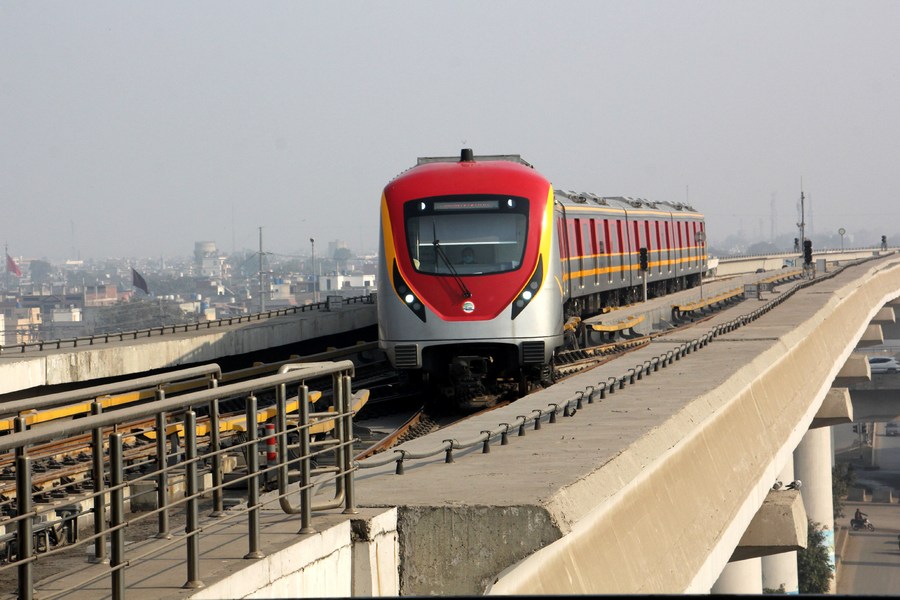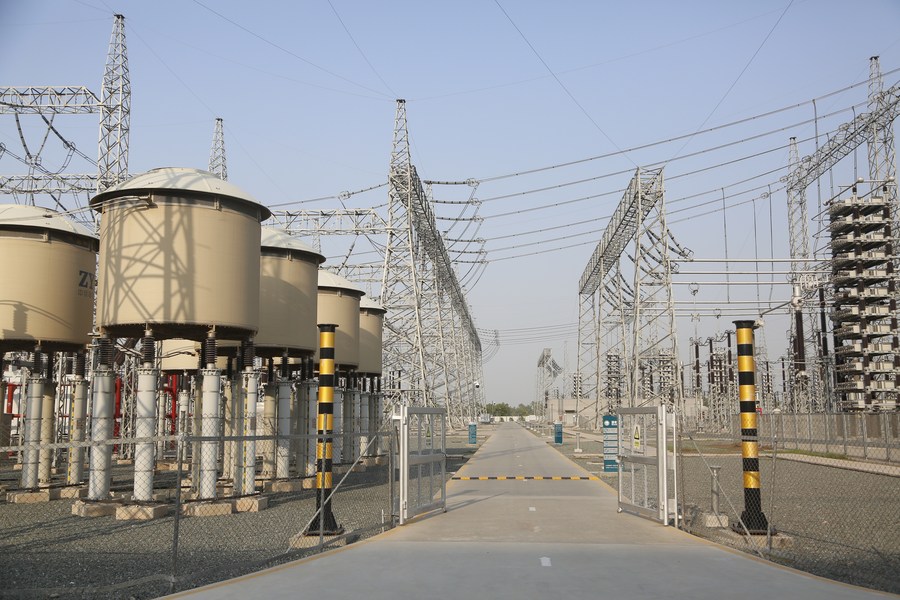Xiplomacy: How an economic corridor has changed lives in Pakistan

Aerial photo taken on June 22, 2022 shows a view of Karot Hydropower Plant in Pakistan's eastern Punjab province. Karot Hydropower Plant, the first hydropower investment project under the China-Pakistan Economic Corridor (CPEC), was put into full commercial operations on Wednesday. (CTG/Handout via Xinhua)
By embracing the opportunities presented by the CPEC and learning from China's development, Pakistan could build a more prosperous and sustainable future for its people and contribute to regional and global development.
When the China-Pakistan Economic Corridor (CPEC) was launched in 2013, Moaaz Awan, a student at the time, hardly anticipated the tremendous change to come.
In 2013, the CPEC, under the broader Belt and Road Initiative (BRI), was no more than a line segment on the map from China's Kashgar in the north linking Pakistan's Gwadar Port in the south.
In 2015, Chinese President Xi Jinping paid a state visit to its "iron-clad" neighbor. The two sides signed more than 50 cooperation deals, agreeing to focus CPEC development on four key areas: the Gwadar Port, transport infrastructure, energy and industrial cooperation. Since then, the design on paper has rapidly become a reality and unleashed tremendous development dividends for ordinary Pakistanis like Moaaz.
NO MORE POWER SHORTAGE
"The CPEC has undeniably brought profound changes in my life," said Moaaz. The 30-year-old is no stranger to China. He studied in China for several years and speaks fluent Chinese language. His father, Zamir Ahmed Awan, is a sinologist who once studied in China after China has started reform and opening-up and served as a diplomat in Beijing.
Moaaz is now a senior manager at China Three Gorges South Asia Investment Ltd., the operator of northern Pakistan's Karot hydropower facility, which celebrated its first anniversary of safe operation at the end of June 2023.
The Karot hydropower station has generated 3.64 billion kilowatt-hours since its full operation, saving about 1.59 million tons of standard coal and reducing about 3.98 million tons of carbon dioxide, meeting the electricity demand of more than 5 million people.
When the CPEC was launched a decade ago, Pakistan suffered severe power shortages. People had to live with over 12 hours of load-shedding a day. With CPEC energy projects, such as the Karot plant, Pakistan can address its energy crisis and achieve greater energy security, reducing dependency on power imports and ensuring a stable power supply for industries and households, said Moaaz.
Environmental protection was prioritized during the construction of the Karot Project, said Moaaz. A comprehensive management plan was developed to protect fish habitats, conduct awareness drives, carry out plantation drives and provide opportunities to surrounding communities.
FROM UNSKILLED TO SKILLFUL FARMERS
During the past 10 years, the uninterrupted power supply provided by the Karot hydropower plant during the height of summer and the convenience brought by other CPEC projects, such as the Lahore Orange Line metro train, the seamless Havelian to Thakot expressway under the Karakoram Highway Phase Two project, have driven more Pakistanis to be a part of various CPEC projects.

An Orange Line metro train pulls into the terminal station in Lahore, Pakistan, Dec. 29, 2021. The eco-friendly Orange Line metro train is an early project under the China-Pakistan Economic Corridor (CPEC), a flagship project of the China-proposed Belt and Road Initiative.(Photo by Jamil Ahmed/Xinhua)
Muhammad Ammar Asghar is one of them. Asghar, a Ph.D. graduate from China's Northwest A&F University, is an agronomist working on a red chili contract farming project. Large-scale agricultural cooperation between China and Pakistan is a main focus in the second phase of the CPEC, which is currently underway after the success of the first phase focusing on infrastructure and power projects.
Speaking to Xinhua, Asghar said that most farmers hired by landowners in the project are unskilled. To help landowners get a high yield, Chinese agronomists and agriculture technicians helped the farmers with the timing and use of fertilizers, pesticides and water.
Rao Shahab, one of the landowners who cultivated chili, said that this year he experimented by planting chili on seven acres of land and was so impressed by the yield that he plans to cultivate 50 acres next year.
ECONOMIC CORRIDOR, DEVELOPMENT PATH
"Seek knowledge even if you have to go as far as China" is a famous Muslim adage. Zamir, then counselor of the Pakistani mission in Beijing for higher education and technology, is glad to see many aspiring young Pakistanis seeking advanced technologies and expertise in China. "The CPEC has not only strengthened economic ties but also fostered people-to-people connections, cultural exchange and understanding between the two countries," he said.
Zamir visited China's Guangzhou this June, and the changes in China over the decades have been astonishing. Pakistan has never had such scale of industrialization since its founding, said Zamir.
He said that by embracing the opportunities presented by the CPEC and learning from China's development, Pakistan could build a more prosperous and sustainable future for its people and contribute to regional and global development.
In the past decade, the CPEC has made tremendous progress, attracting 25.4 billion U.S. dollars of direct investment, creating 236,000 jobs, generating 8,000 megawatts of electric power, building 510 km of highways and adding 886 km to the core national transmission network for Pakistan. The Gwadar Port became fully functional and is on its way to becoming a regional hub of connectivity benefiting Pakistan, Afghanistan and Central Asia.

This photo taken on July 3, 2023 shows a view of the ±660kV Matiari-Lahore high-voltage direct current (HVDC) transmission project under the China-Pakistan Economic Corridor (CPEC) on the outskirts of Lahore, Pakistan.(Xinhua/Ahmad Kamal)
For Moaaz, the success of the CPEC lies in how the Pakistani government has total freedom to prioritize its development plans without meeting prerequisites or having strings attached.
China will work with Pakistan to aim for high-standard, sustainable and livelihood-enhancing outcomes and further build the CPEC into an exemplary project of high-quality Belt and Road cooperation, said President Xi in a congratulatory message to the Decade of the CPEC celebration event held in Islamabad, Pakistan.
The project has laid the foundation for enhanced connectivity, trade and economic integration between Pakistan and China, said Zamir. "It exemplifies how two nations can collaborate on a grand scale to achieve shared goals and development objectives."








